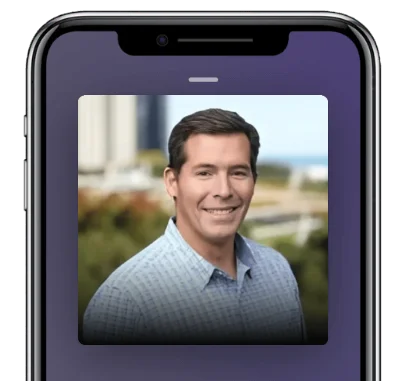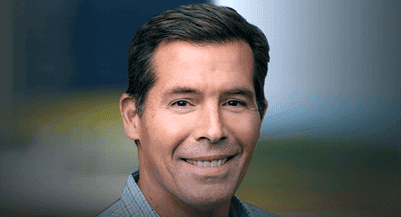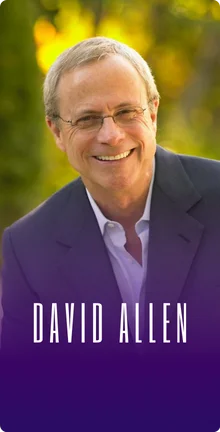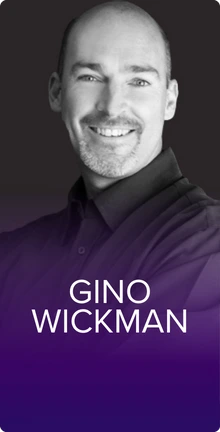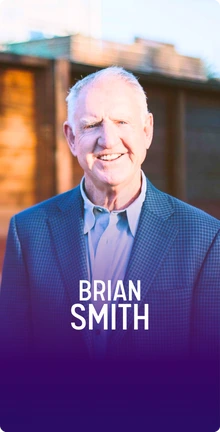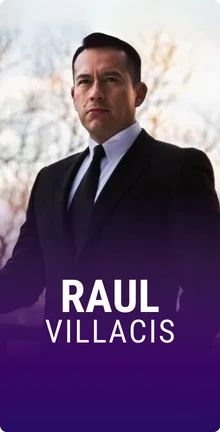Thank you. It’s good to be with you.
I’m sure you’ve probably heard this before that nobody is irreplaceable. As a business owner myself, I sometimes worry about some of my key staff surprising me and leaving at some point. Do you believe that nobody is irreplaceable?
I’d even put it this harshly if you stick your finger in a glass of water and pull it out the ripples are gone pretty quickly and that’s you inside of a company. We like to think we’re irreplaceable but we’re not.
Let’s differentiate for our audience, a career for somebody who is working for a company but they aren’t the owner and a business owner or an entrepreneur who is working for themselves is your book equally valuable for both parties?

We’re talking about the human condition with these distinctions of business owner versus a career employee. What allows you to succeed or hurts your effectiveness is about the human condition and how you deal with stress. How well you understand yourself, how you present yourself and understanding what motivates you. I teach entrepreneurship. I deal a lot with business owners and startup CEOs and small business scalers. I interviewed people in both categories as I wrote this book. It does hold true for either category that you mentioned.
You’re not only a professor but you work at a VC firm, which is an interesting combination. I think of professors as not as financially successful, maybe not financially motivated and then VC is totally at the opposite end of the spectrum. You’re a partner at a VC firm. Share a bit about that story of how you ended up doing both things.
I’ll say that there’s been a strong movement probably in the last few years where business schools, in particular, medical schools and law schools are bringing in clinical professors. You have a category of tenured professors that do research and write a lot. There’s a category of clinicals who are there to teach and they also spend time doing other things. They teach and they bring it to the classroom what they’ve learned or what they know outside of the university. At Kellogg Business School at Northwestern, we probably have 75 clinical professors who are all somewhat like me and that they have other jobs outside of the classroom that they bring in to make their teaching more effective. I think that’s a positive development in business schools. It’s great to have the tenured professors with a lot of deep research knowledge but it’s nice to augment them with people that have a lot of experience in line jobs outside of the classroom.
I was a manager and marketing executive for a number of years at PepsiCo, when they owned restaurants and then later at Frito-Lay. My sister was at this little teeny company selling books online in the mid-‘90s. She told me, “You would love taking your marketing toolkit and applying it to entrepreneurial settings.” That was very influential in getting me out of big companies and moving me to small companies. I went to Electronic Arts video games and I was the VP of Product Marketing. From there, I slid all the way down to a raw startup with a couple of other people that became Blue Nile, which was a company that directly sells diamonds and jewelry aimed primarily at men over the internet. That was in the late ‘90s actually.
From there I went to Walmart where I was part of the team that started up Walmart.com. I was the CEO there. I’ve always believed so much in education. My parents started a school when I was a kid and I knew I’d find my way into educational eventually. Right around the age of 50, I started teaching at Kellogg but I knew that I wanted to keep a leg in the business world. I started doing consulting for a venture capital firm here in town and then they wanted to bring me on. I split my time investing in early-stage software companies for the Pritzker Group Venture Capital firm and teaching entrepreneurship and leadership classes at Kellogg.
Figure out what motivates you so you can put yourself in a career track that gives you natural energy. Share on XYou’ve reinvented yourself multiple times over and I’m curious, what’s the thread that motivated you through that whole process? What’s the core driver of your legacy?
I would say about mid-career, I was realizing that there were some parts of my personality that weren’t fit for being at a big company. I have a little problem with authority. I would find myself having to self-monitor so much because of the hierarchy and I wanted to move faster. Understanding my motives and realizing that I was highly motivated by achievement, but I was also highly motivated by autonomy. My career arc is one of working my way into realizing how much autonomy meant to me. Having discretion over my time, having discretion over my work product and trying to move myself into positions that were higher in autonomy than the ones I held at big companies. The thread is this realization that I drew energy from having a lot of discretion over my own time and work product. Realizing that I could make a leap and construct a career that gave me more personal autonomy. I know from looking at your background that you must feel somewhat the same way of looking at the way you’ve moved in your career.
I couldn’t stand working for other people. It all started when I was in a Ph.D. program at the University of Wisconsin, Madison. I didn’t get along with my advisor as I was studying for my Ph.D. We butted heads. He wanted me in the lab late into the evenings and I had small children at the time. I wasn’t willing to do that. Eventually, it got to the point where he asked me to leave and find another lab, which would essentially be like starting over when you’re a year and a half into your Ph.D. I decided it’s not worth it to continue and I had met a couple of guys from Netscape at a conference. This was 1994 and Netscape was something that most people hadn’t heard of back then, and I decided to jump and start an agency. That was a pretty wild ride. I’m so glad that I ended up getting pushed into the corner by my advisor because that butting heads with authority. You talked about problems with authority was something that was going to pose a lot of problems for me in a traditional career track for somebody who was studying for a Ph.D. If I go work for a big pharmaceutical company or if I become a professor or whatever, I will try and get tenure all that stuff, that doesn’t sound like fun to me.
I had a great journey. I was able to pick up and move to New Zealand on intuition. I hadn’t even been there. I applied for permanent residency and got in. I convinced my wife at the time and my kids that this would be a good thing. It was amazing. We were there for seven and a half years. It’s been a fun, wild ride and I think of myself as unemployable. I only lasted for about seven months before I couldn’t stand anymore after my previous agency got acquired. They were surprised that I was leaving. I can’t work for anybody else as far as I see it. Maybe that’s a disempowering belief or one that might hamper me in the future but I love being an entrepreneur, building businesses, inventing products and not being part of a big system that I’m just a cog in the wheel.
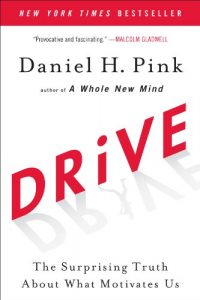
You bring up this question and it sounds like you were tuned into what motivated you. I spent so much effort with students. Even though I’m teaching entrepreneurship, I set time aside to talk about the motive theory. Dan Pink wrote a good book called Drive, it talks about what motivates you. A fellow from Harvard named David McClelland looked into Motivation Theory a lot in the ‘60s and ‘70s. I did all this research around it because I thought if I can help the students in their twenties pinpoint what motivates them, they can make decisions that are better than my early decisions where I’m not in the right setting. I’m struggling in my career and it doesn’t feel round hole square peg. I found that there are these five motives. People could argue there are a lot of motives but there are these primary motives we have. We have a motive around purpose and different people are on the spectrum of how powerful this motive is for you.
People want to work in cleantech or they want to work in healthcare, education or whatever. They’ve driven their values and they want to work in an area that’s consistent with their values. Those are purpose-driven motives. There are people that are motivated by achievement. They like to keep score. They look to improve. They like to see personal progress. There are people that are motivated by affiliation. They like working on a team. That’s important to them. Maybe they should be a product manager. There are people that are motivated by power, status and the ability to influence others directly. There are people that are motivated by autonomy like myself and they want discretion over their time. I spent a lot of time in my class saying, “Figure out what motivates you so you can put yourself in a career track that gives you natural energy.”
If you’re in enterprise sales and you’re out on the road, you probably should have a high achievement motive and high autonomy motive. You can match your motive profile to the types of jobs you pursue. I didn’t understand what motivated me early in my career. I was in this big formal company that was very well-run but it was hierarchical. I felt frustrated with my inability to have agency over my action, over my projects. When I left and went to these raw startups, I felt liberated and it felt very good. That’s one message for your audience if they’re younger or if they are not feeling they’re in the right track. Maybe it’s not a problem around their capabilities, maybe it’s a problem around their motives don’t match the value and the type of company that they’re in.
Is there an assessment that helps you to pinpoint what your motivators are?
Motives are tough and values are what’s important to us. If you ask somebody, “What do you value?” “I value family, I value integrity and I value staying fit.” If you ask people, “Tell me about your motives.” They have trouble with it. A company called the Hay Group did something called the picture story exercise. Think of it like a Rorschach test. They give you these ambiguous pictures and you have to write what’s going on. Somebody scores you looking at your sample writing. You write like a paragraph around eight pictures. The Hay Group Picture Story Exercise is an interesting one. In my book, The Right and Wrong Stuff, I have 40 questions to ask yourself around your motives that you can help understand them. I have one in my book. Then there’s a book called What Motivates You and that is a Gallup-based book that has an assessment in it and that is another one. The Hay Group, you need to have somebody score you on it. If you want to do it on your own, you might want to grab my book or What Motivates You, that’s a book that it’s based on a lot of Gallup research.
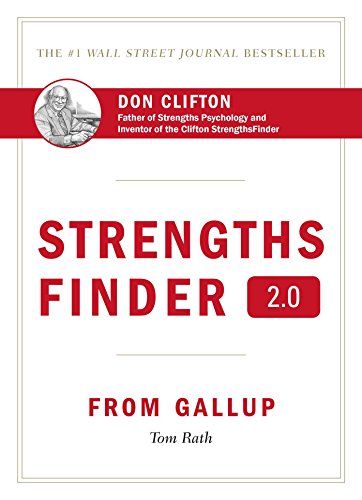
I love the Gallup books, in particular, the StrengthsFinder book and the assessment. I’ve got my top five strengths memorized and I see how they interplay and create a superpower essentially for me, which is pretty cool. I use that in my storytelling to potential clients because I do SEO consulting, I help companies like Volvo and Chanel to the top of Google for keywords that they’re not currently at the top and for the keywords that they are to stay there. I want to differentiate myself from all of the competition and there’s so much competition out there. My huge book certainly one differentiator but another is like this positioning I have like I’m futuristic, input, ideation and strategic learner. I explain what all those mean and how you’re essentially choosing the right partner because I will look into the future and help you to strategically set yourself apart from everybody else. Have you taken the StrengthsFinder assessment?
It’s not doing the person any good to suffer through a position that they can't do. Share on XYes. It’s interesting, Tom Rath, who wrote StrengthsFinder 2.0, he and I have the same publicist, Barbara Henricks, which is fun. I’ve been tuned into StrengthsFinder for a number of years and I actually did this combination. I took StrengthsFinder and I also looked up VIA, Values In Action. Marty Seligman, the author of Authentic Happiness and Learned Optimism. He is also part of the American Psychological Association. He put together this very research-heavy assessment that’s very well-done. You can look up your strengths and I looked at the combination of the two of them. I compared what I get out of StrengthsFinder and what I get what I did Marty Seligman’s assessment and compared if they were consistent.
I’m going to pull up the name of it for the audience if they’re interested. It’s called VIA Character Strengths Test and it’s free, you just have to register. VIA Character Strengths Test and they have 24-character strengths around wisdom, courage, humanity, justice, temperance, and transcendence. I did StrengthsFinder and Now, Discover Your Strengths with Buckingham and Tom Rath. I compare and contrast what I got out of the VIA signature strengths and the StrengthsFinder and they’re very consistent. It was about perseverance, being a relational person, having a zest for living and then being an activator, wanting to start things now.
What do you do with that information? A lot of people will take these assessments, whether it’s DISC or Predictive Index and StrengthsFinder and then they don’t do anything with it. There’s no behavior change. There is no addressing that with creating more relatedness with coworkers and peers. What do you recommend?
Let’s say you’re in the job market, ask when you’re interviewing what type of people do well here? Give me an example some people that have succeeded around my level and have risen up. What kind of traits do they have? Then you can ask another question like, “What’s the culture like here? What kind of behavior do people embody that do well here?” You can compare the culture and the success of the people that do well in the company. You can listen to see if some of your strengths are embedded into the cultures and values and the people that do well, do they have some of your strengths? For example, Walmart where I worked for seven years, one of the cultural emphasis points is on being very much about being an activator, have a sense of urgency and attention to detail. That appealed to me tremendously being somebody who likes to activate immediately as being entrepreneurial. Do the traits you have matched the cultural traits of the company and match the people that do well at the company?
The other thing you can do is if you look at the job, most jobs have the competencies you need around the functional skills. They also have a lot of times the soft skills that are required to do the job well. For example, if you’re in product management, you have to have strong relational abilities because you’re working with a lot of people that don’t report to you. You still have to get the product out the door and you’re working with somebody in finance, software development, supply chain operations and all these people that don’t report to you. You have to be effective in managing as the PM. You would be good in that position if you have a strong relational StrengthsFinder trait as a relater. I would look at the job you’re in, not just the skills you have to be able to use in the job but also the soft skills that you need to be effective in that job. Try to match your StrengthsFinder traits to the type of job that you’re in. The best way to do that is talking to the people that you report to or the HR department and say, “Let’s talk about the job skills in this next level I want to reach and tell me about the soft skills that are needed to be effective,” and see if you’re in the right place.
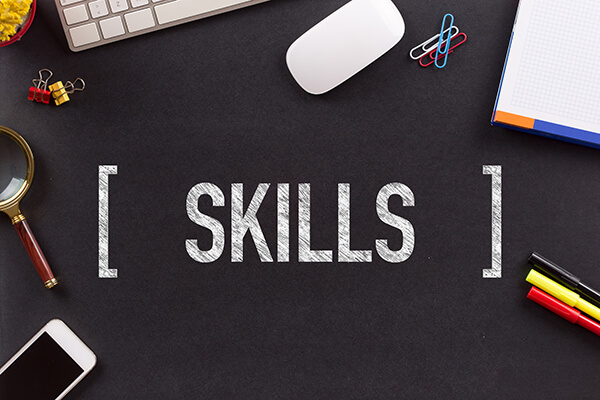
If you’re the entrepreneur or you’re the boss and you have an employee or contractor that you want to get the most out of them and have them be at their best, you make sure there’s alignment there between their top strengths and their job duties.
I’ve spent so many years inside of startups as a VC and then I was in ten years of startups. I can tell you it amazes me how often when we see people that are interviewed, the interview is not rigorous. It isn’t rigorous in terms of the questions that are asked and it’s not rigorous in terms of the job spec that’s created. For the people that are running organizations in startups, make sure you put a lot of time and thought into what will this person that you’re going to hire do in three years that will make you say, “This was a great hire.” What are the goals of the position? What are the success metrics? What soft skills do you want them to have? Make sure you’re pretty diligent in putting that together because you need a yardstick when you’re interviewing. Orient the interviews around those different questions around those different areas.
I’ve had a lot of dialogue with Geoff Smart who is the Chairman of ghSMART and they are a hiring assessment firm. I asked him, “To do a good interview, how long does it have to be?” He said, “You have to prepare for it with a really clear understanding of what you’re looking for in terms of skills and personality traits.” He says, “You’ve got to interview somebody hard for well over an hour to be able to understand fit. You have to have them interview other people in your firm and then take them to dinner to see how they do in social situations.” I’m amazed at what short shrift we give to interviewing when we’re in startups because we feel the burning need to hire people quickly. Unwinding somebody takes so much more time than being diligent in hiring them, in getting the right person.
My wife went to one of Natalie Eckdahl’s events. She’s a podcaster and a business owner. I don’t know if you’ve heard of her but her podcast is called BizChix. She got this piece of advice that was very valuable that you should hire slow and fire fast. I do the opposite, I hire fast and fire slow. The reason why I fire slowly is because I want to give ample opportunity to the staff person to course correct. I give them progressive discipline, a verbal warning, and a written warning. What’s your take on this?
I’ve had the same advice from a boss of mine. I was trying to save somebody, trying diligently to improve this person’s performance. My boss said, “I’ve never fired too quickly. I’ve only fired too slow.” She was a CEO and had many years of experience. She said, “I applaud you for trying to save blank but do you really know what you know?” I said, “I guess I do.” She said, “It’s not doing this person any good to suffer through this position that they can’t do.” I do agree with that comment and I think that you’ve got to spend the time upfront and spend the time on the interview. I won’t do an interview for less than 90 minutes. I want to sit down and I want to understand this person’s motives and why they want the job. I want to understand how they see the world. What proof points they have of success and drill into those and you want to reference check them. Not the references they give you, the references they don’t give you. You want to look in their past and you want to call people that have worked with them and their different career moves. You want to see what people say that they contributed and what it was like to work with them.
We're humans. We're going to have unconscious biases. Share on XLet’s actually walk through what a rigorous interviewing process looks like. Ninety minutes, that’s a lot of questions. That’s a lot of preparation required to make sure you’ve got valuable 90 minutes or even longer session. You’re doing advance work to make sure they’re a fit even to get to the interviewing process. Screening is critical before they waste your time with an interview if they’re not a good fit. Let’s walk through this process.
Starting with having a really good job spec you’re working from, so you understand the goals of the position that you’re hiring for. The key skills they need to have to achieve those goals and the metrics of success. You know, “I’m looking for this person to be able to have these certain skills.” For example, they have to be very analytical because they’re going to have to do breakeven analysis, price demand elasticities, variable contribution analysis, and regression analysis. Analytical skills as exhibited by being able to do those things I mentioned so they can price the product effectively and they can do marketing, return on ad spend analysis. They are analytical skills.
The way I went through that, do that for the position and you’re probably going to have five or six key skills they have to have as exhibited by what ability. Those as exhibited by, you’re going to be asking in their résumé if they have shown that they exhibit those abilities. The first thing is making sure that you have the job specs. From the job specs, you’re going to draft the questions you’re going to ask them. I like to start with really broad warmup questions that allow them to not be nervous, but also something that’s free-ranging so I can see how much discipline they have. I will start with something like, “It’s good to see you. It’s nice of you to come here. Can you tell me about yourself and take me through your background?” That can be interesting. You can have some person that does it in two minutes and you can have somebody that goes on twenty minutes and doesn’t realize. It shows that they don’t have the ability to self-monitor and their personal level of awareness is low.
I’ve said, “Tell me about yourself.” I’ve had someone go on 25 minutes. There’s a little bit of an IQ test buried in that question and EQ. The second thing I’d like to ask is, “Take me through the highlights of your résumé and tell me about the moves you made and why you made them.” What I’m looking for there is their ability to show me that there’s a narrative arc and that there’s a theme to the way they thought through their career and the moves they made sense or were they random? Were they moving towards something? Can they explain these moves and did the moves make sense? Are there some real watch outs that showed bad judgment or showed that they got terminated or showed that they hit a brick wall and had to leave? “Take me through your résumé and tell me about the highlights. Take me through the transitions you made and why you made them. Let’s do that for about ten or fifteen minutes.” Again, sometimes they go on 30 minutes on this one, showing that they can’t be brief and they can’t be concise.
As you’re developing an opinion of these candidates, I’ve learned that you need to check that by noticing that you’re forming an opinion or making an assessment around that person’s fit and then asked for contrary evidence to the opposite. Let’s say, this person seems like they are scattered or they’re not very focused, “Give me an example of a situation where you saved a project or turn things around because of focus and attention, being very diligent on one thing.”

That’s a great way to do it. We’re humans. We’re going to have unconscious biases. You have to be careful that as you start having an opinion of this person, that you check it and you try to stay as objective as possible. Let them win you over with their comments or try not to play judge and jury in the interview. Try to stay as open and keep checking yourself. The way you did it with going into the opposite side of opinion you’re performing is a great way to try to give them a chance to prove your impression is inaccurate.
I did actually learn that from a video but it was ages ago. It was a very expensive video training from the ‘90s on interviewing.
Next, I like them to get a chance to strut their stuff. I’ll say, “Tell me two or three of the things that you’re most proud of in your career.” One, see how much impact these things had and two, is it me or we? Is it I, I, me, me or they say, “What really was fun is our team won the contest for this and I had a strong leadership role in that effort but it felt so good to see this team.” I’m looking for was this something that is impressive and was it measurable but also was it something this person oriented around team or self?
What if they’re motivated by self or seem to be? I would probably answer a lot of me, me, in that situation.
I would say that certain positions if there are individual contributor positions that are strong about me and the work you can do as an analyst, that might be okay. My experience in businesses, most business is a team sport. Even if you did something that was killer, there are always a host of people that helped lift you up to that position and allowed you to do it. Giving credit where credit is due with your office support staff or somebody in the purchasing department that helped you be able to buy that product cheaply. Giving credit where credit is due is important. I ask a failure question or two and I won’t stop until they get to a true failure because if they say they haven’t failed, they’re not being honest. We’ve all failed.
If an interview is going well, it feels like a conversation. Share on XDisguise a strength as a failure.
You want to know when something didn’t go well and you had a setback in your career or in your life. What did you do about it and how did you handle it? You’re looking for resilience, you’re looking for bounce back, and you’re looking for their ability to be self-reflective and thoughtful and make lemonade out of lemons. Sometimes you get people that say, “I really haven’t had a failure.” You’re wondering if that’s an integrity issue. If they won’t go there, either they’ve very low self-awareness or they’re actually full of fear and they can’t face their failures.
You need to get very specific with them. If they’re giving generalities you need to say, “I need a specific situation where you exhibited this trait, where you turned lemons into lemonade.”
You’ve got to drill down in that one to get them there. You can win an interview by the smart questions you ask about the company. I leave plenty of time to say what questions they have about the job and what questions do you have for me. What questions they have about our company or our department, industry or the technology we create. The good people are curious. They have learning agility. They’re lifelong learners and they will pepper you with great, insightful, interesting questions and they’ll get you in a fun dialogue. When someone says, “I don’t think I really have any questions.” It’s a huge warning sign for me.
It’s also lack of attention and focus to do the homework ahead of time. I’ll ask if they’ve listened to any of my podcast episodes if I’m interviewing them, if they’ve been to my website. It’s shocking how many haven’t even visited my website.

I was all over your website before this because that’s part of the way you prepare. That’s what we do. I will interview people at Walmart and I will say, “Tell me what stores you went to and what you thought of the stores?” I’m like, “Their stores are all over the place.” The good ones will say, “I went into the store outside of Toledo and actually I asked the store manager if I could have someone to walk me around. I went with the Electronics Department Manager who walked me around and showed me the new kiosks you guys have put in there to try to increase the uptake on cell phone services. I went ahead and tried it myself.” I’m like, “This guy’s good.” He’s showing a tremendous amount of initiative.
Here’s my ultimate philosophy about these interviews. When you’re interviewing for a job they’re interviewing you because they’ve got a problem and they want to know if you can fix their problem. You can’t go into the interview thinking about making sure you can adequately answer questions about your past and your résumé. You have to go in there proactively thinking about, “How can I help this company do better?” Being proactive and looking at their websites, going in and buying their product, taking apart their product, if they’re a service company going through the service themselves, taking notes, taking pictures, and interviewing people. Bring that stuff, that fodder into your interview and you will show initiative and you will be able to talk proactively about what the company can do better and differently and that will impress them.
Once the person has gone through this interview with you that you’ve conducted, would you say that there is a guideline around how much they should be talking versus you should be talking? Is it 70/30, 30/70, what’s your suggestion there?
That’s a good thing to add because a lot of times you’ll see senior people doing interviews. They’re so used to talking from the mountain that they talk in these interviews instead of listen. I would say you want them talking 75% to 80% of the time. You definitely want to interact with them to make sure that it’s a dialogue that’s enjoyable and you’re together. If an interview’s going well, it feels like a conversation. It feels like you’re problem-solving together. If an interview is going poorly, you ask a question, they answer it, you ask another question and they answer it. It isn’t a dialogue. It’s like when you’re pitching, we see hundreds and hundreds of people pitched to us their startup ideas. I say to them, “If you whip through your pitch, it didn’t go well.” You want them stopping you on slide two and saying, “Let’s talk about that more.” If you get through three slides of your deck but they’re engaged, that pitch is probably going well. As the person that’s doing the interviewing, you want to make sure that you give them plenty of time to talk and you have to ask questions but you don’t want it to be 50/50. You want it to be probably more like 70/30, 75/25, and you have to watch yourself that you’re not taking up all the air time because how can you be evaluating somebody if you’re doing that?
While you’re doing this, listening mostly and talking not nearly as much, you also have to be selling to them. The very best candidates are evaluating you as much as you’re evaluating them.
Impact questions stop you on your heels and make you think and lead somebody into divulging more about themselves. Share on XIf you’re interviewing someone, here’s what I usually say, “We’re going to have this interview and I’ll ask a few warmup questions. We’re going to dig into questions that are about the skills and traits we’re looking for in the job.” I will make sure I give you a lot of time to ask me questions and to talk about the company at the end of the interview, don’t worry about that. We’re going to have plenty of time. If you like what they’re saying, you go on the offensive probably two-thirds of the way through and you start talking about the company and what you’re trying to accomplish. You’re excited about what you’re hearing from them. If it’s going well, there seems to be an energy that happens and then a shift occurs probably 60% of the way through the thing where you start doing a little subtler selling.
As the candidate, they’re trying to sell themselves and if they’ve done any negotiation training, they’ve read the book, Never Split the Difference for example. They’ve read Influence by Robert Cialdini. They might be doing something like asking at the beginning, “What intrigued you about me that you wanted to spend 90 minutes interviewing me?” You’re digging out from your subconscious all these great reasons, which then further reinforces that they’re the right fit and they didn’t do anything other than get you to ask.
I will try not to let them do that. I will say, “We’ll have plenty of time to go into that. I would love it if I can get through the questions I have and the material I need to be able to make a good assessment. We’ll have plenty of time for you to ask me questions and for us to go off the beaten path later.” I will try to take it right back into your best interests are served by letting me get through this material so I can have a good accurate view of you.
You’ve got to control the frame. As the interviewer, you have to stay in control of the frame. The one with the most powerful frame I’m talking from like an NLP, Neuro-Linguistic Programming is the one who is going to drive their agenda. You don’t want the candidate driving the agenda unless you’re the candidate.
That Cialdini book is amazing though. It’s a great book. For those of you that haven’t read Influence, it’s a seminal piece of work probably in the mid-‘80s that is still referred to a lot.

He’s got another book, Pre-Suasion. I saw him and I had a chat with him. He spoke at Genius Network at the annual event. He is awesome. Hopefully, he is going to be on the show. Fingers crossed, he did say that he would do it but we didn’t set a date yet or anything. I mentioned the book, Never Split The Difference. Have you read that book? Are you familiar with it?
No, but I’m going to make a note of that because I’m an avid reader.
I’m very excited to have Chris Voss, the author of that book be on the show. If you go into the interview as if it’s a negotiation or at least with negotiation skills ready, you’re going to end up with a much better result than if you have no clue about negotiation skills and tactics. For example, one thing I learned from this book doesn’t specifically relate to the interview. If you are doing outreach, let’s say via email, you’re leaving a voicemail or something to somebody that they blew you off or they’re not being very responsive to you, most people will try and get a yes from that person like, “Are you still interested in working together? Would you like me to prepare a proposal? Do you have time to go over the proposal I submitted in the next week or so?” Those are not nearly as effective as invoking a no answer. Imagine this instead, “Have you changed priorities and SEO is no longer a priority for you?” “No, I have not given up on SEO.” That’s powerful.
What I liked that you’re doing is you’re getting into the whole area of impact questions too, which are good questions. Impact questions stop you on your heels, make you think and lead somebody to divulging more about themselves or about their company that if you’re a salesperson are helpful. An impact question might be the one you said. That’s a terrific impact question. The impact question would be the one you led with, “What about me that made you want to grant a 60-minute interview?” If you’re a salesperson, “What about our company or product allowed you to give us an hour of your time?” Impact questions are interesting and we use them. We talk about them a lot in selling strategy at our company. You can’t do too many. If you use too many of them, it’s off-putting. It’s fatiguing so you have to use them wisely.
Another key point is if you differentiate yourself from everybody else in the consideration not by specifically saying it but by demonstrating that you are the only solution to their problem. The only person, company or a product that fits all these different requirements that they didn’t even know they had. You’re helping set the decision criteria or the attributes that they’re going to make their decision on. That’s very cool too. Let’s say that now we’re done with the interview process, we’re feeling good about that interview. You’ve probably taken copious notes as the interviewer. You also have that job spec. This is interesting too. I’ve learned a process for developing a job spec or a framework that includes the metrics of success that you were describing. It also includes differentiating the roles from the responsibilities. You might have three or four roles but you might have a dozen or a dozen and a half responsibilities. You also have, in addition to the success metrics handoffs. This is where your job or the job that you’re defining ends and another person’s job begins.
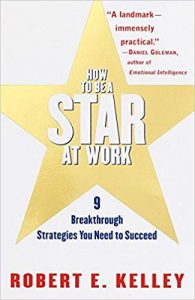
The research I’ve seen around high performers, I’m thinking of research by Robert E. Kelley who wrote How to Be a Star at Work is rigorous research and he said that one of the key traits of stars is they bridge the inevitable drop-offs between departments. They build bridges between groups and all of those points where the transfer of an initiative or project where things fall between the cracks, between sales and marketing, between operations and customer service. Between supply chain and merchandising or whatever it is, those points where things fall into the void, stars understand the importance of carrying the handoff to the next department.
You’re either contributing to siloes in the company or you’re breaking them down.
You’re building bridges to other departments or you let that void between the departments stand.
You also need to take that job spec and connect the dots between the person’s strengths. I don’t know if you have your candidates do any assessments before coming in for the interview, I do. I have them do DISC. I have them do StrengthsFinder if I think that they are a very compelling candidate. If I’m not sure, I’ll have them do StrengthsFinder after they do a compelling interview. I don’t want to hire somebody until I know what their top strengths are and then I want to connect the dots to the job spec with those top strengths. I also have them do the Demartini Value Determination Exercise. It’s on Dr. Demartini’s website.
It’s a free assessment, probably takes about twenty minutes. It describes what’s most important in terms of people’s values. Is it family, fitness or whatever? If I can see what their top values are in their hierarchy of priorities, then I can map those to their job duties and responsibility, which is very insightful and very powerful. It gets a maximum alignment and draws out the intrinsic motivation within them because they connect the dots even at the subconscious level like, “If I’m really into travel, one of the benefits of working for Stephan is he is a ninja at using some of these different travel tools and websites. I had never heard of Skyscanner before or I had no idea that you could beat the system that Priceline has as far as the name your price thing. I’m going to learn amazing things about travel so that I can travel the world at some point for much cheaper price.” You’ve connected the dots for them. They don’t have to try and figure that out on their own.
The first and biggest reason people run into career trouble is interpersonal issues. Share on XIt hearkens right back to my first point on motives. If you can find a way to peg their motives and understand how well those motives do or do not fit into the job, it will either incent them to be more excited or you will know ultimately, they’re not going to have the energy for it.
How many careers do you think people will have in a lifetime?
I’ve heard the Millennials are going to move fifteen times. This the latest research I’ve seen. My generation, I’m a Boomer, it was five. Being agile is more and more important, especially with the technology disruption we’re seeing.
You have five archetypes of derailment and I took the assessment on your website of course as part of my preparation process. I’ve got a twelve for Solo Flyer and Whirling Dervish, which are not huge numbers. I looked at the scoring and whether I should be worried or not. I’m not worried about it but I do want to address those. The other ones are low like a six, etc. Can you walk us through briefly what those five archetypes are and then how do you fix it if you’ve got a bad score?
I did a lot of research and there are five reasons I found. There are more reasons why people derail at five but there’s five that come up time and again. I interviewed a ton of people. I talked to 100 people who got fired or demoted. I talked to executive coaches and HR heads and C-Suite executives and these five reasons appear over and over. To make it more palatable, I created these archetype characterizations so that you don’t say, “I suffer from interpersonal issues.” You can say, “I have a little cap and it’s fantastic in me.” I try to make it a little more conversational. You mentioned Solo Flyer and Whirling Dervish. The first reason and the biggest reason people run into career trouble not surprisingly is interpersonal issues. They have trouble with ego management, they have poor listening skills or they have a dark side tendency that comes out under pressure that they have trouble controlling. That archetype is Captain Fantastic, which I’ve created. That’s a tough one to fix because a lot of those can be character traits that you’ve got to work on. In the book, I have remedies or corrective measures. Most of the book is about corrective measures actually. I talk a lot about it but the Solo Flyer are people that are strong individual contributors that like to control the work themselves. The biggest challenge they have is realizing that if they want to get up in an organization, they’re going to have to learn to be a coach more than a player.
Dan Sullivan calls this the rugged individualist.
It’s easy for strong performers to be Solo Flyers because they know if they do it, it will get done right. It’s hard to go up in the organization with that attitude because the jobs get complex, very broad and you have to count on other people to do a lot of the work because you’re now a professional enabler. You’re a professional coach.
The CEO of a $1 million business is not the same person as a CEO of a $10 million business. Those are different skill sets.
The third one is called Version 1.0, which is essentially somebody that isn’t adaptable to change. The solution there is you’ve got to stay curious. You’ve got to stay curious about emerging technology, about changes in the macro environment and about competitive threats. You’ve got to be outwardly focused and can’t get stuck in your office pushing paper.
Enthusiastic, I would add about the future and not resilient about it.
If you want to get up in an organization, you’re going to have to learn to be a coach more than a player. Share on XThe fourth one is the One Trick Pony, this is somebody that moves up in a vertical way through an organization but doesn’t take the lateral moves to be able to understand how all the pieces fit together. They’re viewed as being nonstrategic. Maybe it’s the controller of a company who wants to be the CFO but he doesn’t have any experience with forecasting, long-term strategic planning, working with the strategic business units on optimizing their operating performance or dealing with investor relations. They’re narrow and they have to be willing to take lateral moves to broaden themselves. They’ve got to see their career as a journey that is going to have some off-ramps and some stops along the way to get seasoned instead of a vertical march up the ladder. That won’t do it in the long-term.
You can’t be rigid.
You’ve got to be adaptable. The last one is the one that is the highest self-reported reason for derailment. People think that the biggest reason they run into trouble, I call it the Whirling Dervish, which is basically you don’t deliver on promises because either you’re a poorly organized, you’re overextended, you have too much on your plate and you can’t say no.
There’s a lot of overlap there with the Solo Flyer who feels like they need to do everything themselves, that only they are going to do the very best job at it.
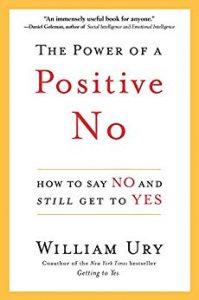
What I will tell Whirling Dervishes is one, “Do you have a system?” It’s like David Allen’s book, Getting Things Done. “Do you have a system that you use to be effective?” Second I’ll say, “Do you say no?” The book I love, The Power of a Positive No. It’s this great little simple book, it’s by the guy that wrote Getting To Yes, Bill William Ury. He’s a Harvard guy. I ran into him at a TED thing and I said, “I love that book you wrote, The Power of a Positive No.” He said, “I loved writing that book.” Remember when you’re saying no, that you’re saying yes to something else that’s important to your life. Give yourself the courage to say no but you’re saying yes to your wife or your husband. You were saying yes to your kid’s soccer game. You’re saying yes to a workout for your heart. Remember when you’re saying no, what you’re saying yes to.
Two related books on that topic, one is The ONE Thing and another is Essentialism.
Essentialism is terrific. I like that one too.
David Allen is an amazing and I’ve had him on this podcast and that was incredible. Folks will go and pick up the book and read through it but if they wanted to work with you in a coaching or consulting capacity, I know you work with companies that are startups that are funded by your VC firm, can somebody work with you if they’ve got endemic problems in their organization that they want to uplevel in their career?
The book is a labor of love because I saw people derailing and I realized there’s not a lot written about leadership failure or managerial failure. People always write about management success. I wrote the book because I cared about the topic. What I do to make an income is I invest in companies and I teach but if somebody wants to write me or contact me about an issue they’re facing, I’d be happy. I do a little professional speaking but it’s not my core way. It’s not part of my personal business model. If you want to reach out to me, you certainly can. Probably the easiest way is by going to do CarterCast.com or going through my Kellogg address, which is C-****@******************rn.edu.
Thank you, Carter. To our audience, take some action because this is incredible stuff that will help elevate your career and your business to new heights.
Thank you, Stephan. I learned a lot by listening to you talk about interviewing and some of these book suggestions are terrific. Thank you.
Thank you. I’ll catch you on the next episode. Thank you again, Carter.


